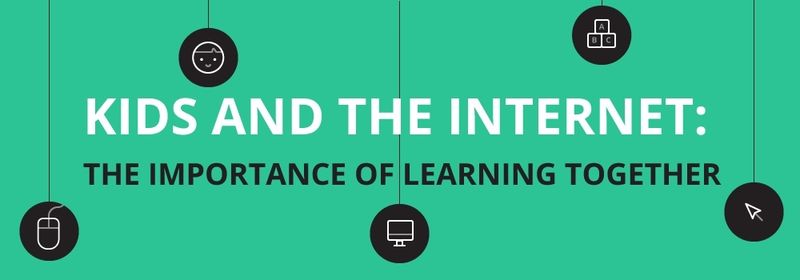Kids and the Internet: The Importance of Learning Together

Let’s face some facts…
Social media is to our kids what malls and parks were to us growing up. If we don’t hang out there with them and teach them how to be safe and kind while they’re young, we’ll lose permission to have input by the time they think their know-nothing parents are the bane of their existence.
When I was in grade eight, my best friend and I got wind of an out-of-service telephone number kids our age called to meet other kids. We’d dial the number, shout our digits between rings, and listen for other numbers. Then we’d hang up and either call one of the numbers we heard, or wait for our phone to ring.
Bizarre, right?
And I might think it’s one of those fabricated childhood memories if my best friend didn’t remember the same story. I'm also still (Facebook) friends with one of the random kids we met.
You better believe our parents had no idea about any of it, or it wouldn’t have happened.
At least we believed it wouldn’t have happened. Especially the part where we arranged to meet up at one dude’s house an hour away on public transit. We got lucky — he turned out to be a fabulous human being, quality enough to date my bestie for a while and become a longtime friend of mine.
My story could have had a disastrous ending and turned my friend and I into a sad statistic. It’s easier to ask forgiveness than it is to get permission was our teenage mantra. We kept our parents in the dark for fear of the “no."
Imagine if I had trusted my parents enough to tell them about our odd adventure.
I could have given them a chance to tell me it was weird and potentially dangerous — and maybe they would have said no. But maybe they would have said, “Let’s figure out how to navigate this safely and together."
A trust exchange like that wouldn’t magically happen between a 14 year-old and her parents. It would have grown roots when the child was young enough to take in and value her parents’ guidance.
“We tend to try to keep [kids] out as much as possible, tell them it’s full of creeps and strangers (it has some, admittedly), and then when they turn thirteen, drop them legally on Main Street with a whole bunch of panicky warnings about not doing anything dangerous or stupid. Maybe we walk with them awhile, if they’re lucky." -The World’s Biggest Small Town: or, Be the Twit you Want to See in the World, Bonnie Stewart
My daughter has had social media accounts since she was nine years old.
Not because I’m a forward-thinking, progressive type, but because social media is where I hang out, and I wanted to bring my daughter along. And because it’s been a (mostly) great experience for me, I did so without much thought.
Now, because she’s had so much monitored online experience, I trust that when she’s a teenager being lured into (or instigating) tricky situations, she won’t navigate those spaces with wobbly beginner legs and zero modelling. And she might even trust me enough to ask for my insight. (Okay, probably not, but a mom can hope.)
“Teens are always much more willing to just try things out. But just because they are willing to try things out doesn’t mean that they understand how it works. That doesn’t mean that they are inherently technologically sophisticated or understand technology in the ways that are often implied by ‘digital native.’" -Stop Freaking Out Parents: Social Media Isn’t the Problem, Andrew Leonard
Sure, social media can be a scary place, but so can your basement. Good online citizenships is a life skill — just like sturdy handshakes (as a former elementary school teacher who’s endured her share of dead-fish handshakes, I can tell you this skill is undervalued), laundry, meal-planning, and grocery shopping. They need our guidance in this virtual world as much as they do in the real one.
So get in there!
Here are some ideas to introduce your little ones to social media:
- Sign up your child for a Postach.io blog and let them play. Edit their posts together before they’re published. You can see what they’re writing and teach them self-editing skills. Share the URL with friends and family and encourage readers to leave comments.
- Sign up your child for private Twitter and Instagram accounts. They can follow and interact with trusted friends and family. (Yes, most social media accounts have a minimum age of 13 because of the Children's Online Privacy Protection Act in the United States, and that’s something you’ll have to negotiate as a family.)
- Make sure you’re active on these platforms so you can not only follow them, but know enough about each channel to monitor and guide your child’s usage.
Here are some ways to stay close to your teenagers online (if you’re not already there, and maybe even if you are):
- Ask your teenager to set you up on Facebook, Twitter, Instagram, etc.
- Ask your teenager to teach you about things like hashtags and other etiquette/norms for each platform
- Ask your teenager what they love about being online
- Ask about the people they’ve met through Twitter or Instagram
- Ask what they think it was like being a teenager without social media
- Ask a lot of questions and do a lot of listening
Try to have fun. Be the kind of family that can tackle and talk about the hard stuff. Your kids will thank you. Even if it’s not with words.
“For most of us, the modern world is full of gadgets and electronics, and we’d do better to reflect on how we can live there than to pretend we can live elsewhere." - The Pointlessness of Unplugging, Casey N. Cep